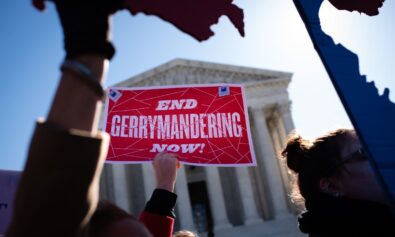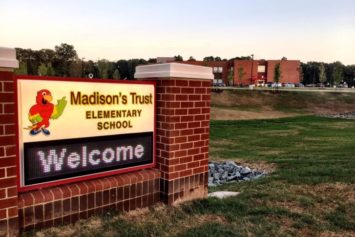
Photography for the Mystic Valley Charter Schools (American Enterprise Institute)
The debate over charter schools — and whether they provide a benefit or do harm to Black and low-income children — is brewing once again. And the Civil Rights and Black Power movements are drawing a line in the sand. This, as parents seek control over their children’s schools and the educational process.
The NAACP, the nation’s oldest civil rights organization, recently passed a resolution at their national convention in Cincinnati calling for a ban on privately managed charter schools. The resolution said the following:
* “Charter schools have contributed to the increased segregation rather than diverse integration of our public school system.”
* “Weak oversight of charter schools puts students and communities at risk of harm, public funds at risk of being wasted, and further erodes local control of public education.”
* “[R]esearchers have warned that charter school expansions in low-income communities mirror predatory lending practices that led to the sub-prime mortgage disaster, putting schools and communities impacted by these practices at great risk of loss and harm…”
The civil rights organization also called for a moratorium on the growth of charter schools, a review of their disciplinary practices, an end to charter school exploitation of communities and neighborhoods, and transparency and enforcement of laws to prevent fraud, waste and corruption.
“At the NAACP we have looked holistically at the whole charter school movement, and we think there should be a moratorium on charter school expansion and oversight over the charter schools,” Dr. Joan Evelyn Duvall-Flynn, president of the Pennsylvania Conference of NAACP Branches and an educator, told Atlanta Black Star. “The money is going missing, there is no local control, the discipline has proven harsh, and they’re resegregating the children. There are all the things that the NAACP has worked for 107 years to change.”
This comes as the Black Lives Matter movement weighs in on the issue of education. The Movement for Black Lives issued a sweeping policy paper called A Vision for Black Lives, which included a section on education entitled, “An End to the Privatization of Education and Real Community Control by Parents, Students and Community Members of Schools Including Democratic School Boards and Community Control of Curriculum, Hiring, Firing, and Discipline Policies.” The report argues that 60 years after Brown v. Board of Education, the school-to-prison pipeline denies Black people the right to an education, while school privatization removes the ability of Black people to determine the type of education their children receive.
“This systematic attack is coordinated by an international education privatization agenda, bankrolled by billionaire philanthropists such as Bill and Melinda Gates, the Walton Family, and Eli and Edythe Broad, and aided by the departments of Education at the federal, state, and local level. Inequitable funding at the school district, local and state level leave most public schools — where poor communities of color are the majority — unable to provide adequate and high quality education for all students, criminalizing and targeting Black students through racist zero tolerance discipline policies,” according to the report. The Movement for Black Lives demands education as a human right, protected by the federal government; an end to state takeover and mayoral control of the schools; democratic structures such as people’s assemblies to allow parental governance, fully funded schools, and federal funding only to school districts with fully elected school boards.
“There are a couple of things one has to unpack. One is, are they good or bad? You can set aside whether any individual charter school is good, and some are,” Susan DeJarnatt, a professor at Temple University Beasley School of Law and a leading national expert on charter schools, told Atlanta Black Star.
According to DeJarnatt, even with good charter schools, there is a funding problem. In most states, school districts fund the charter schools by paying the per-pupil expenditure for each student enrolled. In Philadelphia, for example, the school district must pay a charter school $7,000 in taxpayer funds for each charter student, including students who were not previously enrolled in the district. DeJarnatt notes that this is a loss of revenue the public school cannot make up.
In his blog, “With A Brooklyn Accent,” Mark Naison, a professor of African American Studies and History at Fordham University, argues that the scandals facing charter schools — including “mistreatment of students, teachers, and families, and fiscal issues ranging from mismanagement to outright embezzlement and fraud”— resemble the subprime mortgage crisis.
“In each instance, an institution initially aimed at expanding opportunity for those with limited resources became, because of government favoritism and lack of oversight, a vehicle for profit taking on a grand scale by the very privileged that sometimes left those the institution was designed to help in very bad shape,” he wrote.
“Research has shown us that these charter schools are arising in poor communities where the students are African-American, Hispanic, Southeast Asian, and one of the things research has shown is the expansion of charters schools mirrors predatory lending,” Dr. Duvall-Flynn said. “When the tax base is low, less money is going to the public,” she explained. “Schools have less resources, it is harder to maintain the facilities, harder to maintain sufficient teaching staff. We also noticed over the years that charter schools were leading to the resegregation of the schools. In that resegregation process, they were re-creating the white supremacy model,” she said, using Chester, Pennsylvania, as an example. “The (Chester) school district is paying the charter school millions of dollars, and the public schools were going without physics, libraries. None of that is available because of the funding.”
According to the NAACP leader, due to charter schools, billions of tax dollars are missing nationally, unaccounted for.
“The areas where the charter schools are put are going without high-quality resources and upper-level courses and foreign languages, and the tax money is going over there and disappearing,” Duvall-Flynn claims. “How do you allow people to take the money and not account for it?”
“In the Pennsylvania charter school law, the charter school did not have to account for the money it did not use. It went into a hole and they did with it what they wanted to, to the concern of state legislators,” she added. “The charter school coalition has lobbyists in Harrisburg every day pushing for advantages, and it is difficult to get the charter school law changed.”
In Duvall-Flynn’s view, the charter schools are opened as “entrepreneurial exercises” by business people who are allied with legislators.
“They have lobbyists. The public schools do not have a lobbyist,” she noted. “When you look at the money put together to push charter schools to state legislators, you will find a lot of Walmart money, Amway money, and ALEC,” she said, referring to the American Legislative Exchange Council, which has also sponsored “Stand Your Ground” and voter ID legislation throughout the country.
DeJarnatt noted that Bill Gates and the Walton Family Fund have invested millions of dollars into charter schools. And while Gates is wealthy, he knows absolutely nothing about education.
“Even if they are doing it with the best of intentions, where’s the community? It bothers me that there is no elected accountability. Each charter has a board selected like any nonprofit board. Some have parent representatives, but it is certainly not a board of community members who decided ‘let’s start a school and this is what we want’ ” she said, emphasizing that parents need a voice in public education.
Charter school opponents are concerned that school choice, including school vouchers and charters, has signaled the privatization of public education. The notion of charter schools as a creature of free-market neo-liberalism is nothing new. The University of Chicago economist Milton Friedman — the father of charter schools, who was among the original advocates for school choice — laid out the case for a free-market approach to public schools in his book, Free to Choose: A Personal Statement.
“He said you can’t go right to privatization, because the public is not ready for that. Once you have charter schools then you push for vouchers, and when you have vouchers then you push for total privatization,” Duvall-Flynn commented on Friedman. “His goal was to have a free flow of money and any parent can say, ‘I want Johnny to go to school in Wisconsin.’ Take the voucher. He said people should be able to shop for schools like they shop in the supermarket,” she noted.
In Free to Choose, Friedman wrote that “The threat to public schools arises from their defects, not their accomplishments.” As a result of free-market principles unleashed on the public schools, he predicted that “some public schools would be left with ‘the dregs,’ becoming even poorer in quality than they are now.” Presumably, those “dregs” would amount to the poor, the Black and the brown. Educators and advocates have warned that as the purpose of business is to make a profit, if public schools assume a free-enterprise model, then the profit motive would interfere with the learning process, leading to a scaling back of resources for education.
“There is a built-in competition that is dangerous for a district educating children of color,” DeJarnatt said of the free-market charter model, as well as the issue of racial segregation. “There are a number of charter schools that are over 70 percent white” in a city such as Philadelphia, according to the law professor. This, in a city which is majority people of color and only 35 percent white, according to the U.S. Census. Philadelphia is a useful location to study the issue of charter schools, DeJarnatt has found in her research, as it ranks third in the nation in the number of students enrolled in charter schools (62,000).
Moreover, the draconian “zero tolerance” and “broken windows” policies that have shaped the American criminal justice system have their counterparts in the charter schools. Although these institutions are publicly funded, and are allowed to raise other revenue, they are privately managed. Charter administrators are autonomous and free from regulation, and allowed to develop methods of discipline with complete discretion, free from accountability.
“One thing that is very important and very fraught is the pedagogy in ‘no excuses.’ There is no excuse for kids not to succeed; poverty is an excuse — which sounds like a good thing,” DeJarnatt noted. “The relationship to broken windows is a pedagogy that is teacher-controlled. They say there is no tolerance for any deviation at all,” she added.
“Even though the rhetoric is a rhetoric of choice, they have no personal autonomy at all,” DeJarnatt said. “In a lot of these schools the boards are almost all white. They tend to be very white-dominated institutions running pedagogies that are pretty restrictive of children of color,” she noted, adding that in such environments, it amounts to white people demanding that Black students shut up.
In her article “Charting School Discipline,” which she co-wrote with Kerrin Wolf and Mary Kate Kalinich in the Winter 2016 edition of The Urban Lawyer, DeJarnatt wrote that charter schools maintain a rigid discipline, in which children may be punished for behavior considered “disruptive, disrespectful, or disobedient, and the principal is expected to recommend for expulsion any student who engages in ‘immoral conduct.’… At least 28 schools provide for expulsion for chronic failure to wear the uniform properly, including one that specifically mentions having an untucked shirt.”
Further, students face discipline for “misbehavior” as inconsequential as folding their arms in defiance. In some cases, children are not allowed to talk in the hallways, based on the argument that students must learn and nothing can detract from the learning process.
“It is obvious that the harsher discipline is concentrated in the charters,” Duvall-Flynn said, offering that charter students are kicked out of school and returned to the public school setting, where there is due process. Further, while punishment may be levied on public school children, rarely are they told they cannot return.
“Charter schools often tell the student, ‘You cannot come to school’— and that is about as harsh as discipline can get,” she said.
Ultimately, the NAACP leader points to racism as a reason for the promotion of charter schools, and the inequities they create.
“The increase in the nonwhite population has created in the white power structure a dissonance they are uncomfortable with because it threatens white superiority. There is a pushing and shoving, a manipulation of the law,” Duvall-Flynn said.
“You cannot maintain racial superiority if you allow everyone to excel. Because you never know where genius is and it may rise. You cannot maintain a system of racial superiority and claim racial intellectual superiority if all the kids get all the resources they need and access to learning,” she added. “You are taking these parents’ tax dollars and using it to hurt their children.”


